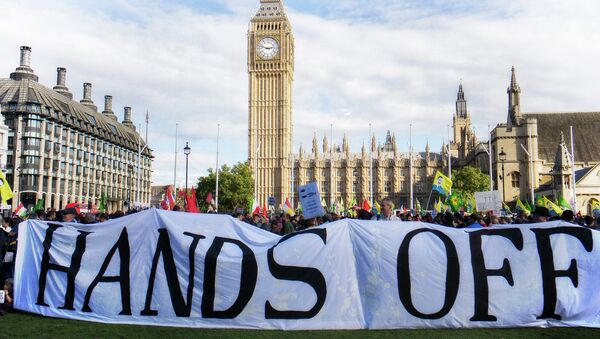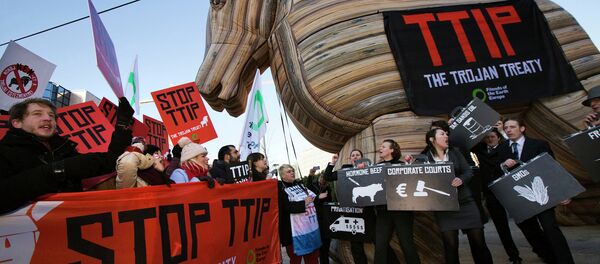The House of Commons' Business, Innovation and Skills Committee (BIS) report featured another damning assessment of the manner in which TTIP negotiations have been handled, which it claims is far too ambiguous to support.
There has been ongoing debate in the UK and Europe in regards to the potential benefits of a TTIP, which is a proposed free trade agreement between the European Union and the United States. The 'partnership' proposes to reduce barriers in the way for big business trade deals across the Atlantic.
Not Enough Information
"The lack of detail available on the negotiations means that it is difficult to assess which is the more accurate argument."
In particular, the report raised concern over the alleged introduction of Investor State Dispute Settlement (ISDS) provisions in a TTIP agreement, which critics say would give foreign investors greater power over host governments in some areas.
In the UK, there is concern that such ISDS provisions would give US healthcare investors the opportunity to permanently privatise the NHS, despite assurances that the NHS would be exempt from such measures.
#TTIP could determine the future of our #NHS
— Laura G (@SavemyNHS) March 24, 2015
Need to be aware of the dangers!http://t.co/yZsbpEY4AG pic.twitter.com/a9Ex7cHku3
Its negotiated in secret & designed by big business. Please sign this petition NO NHS IN TTIP http://t.co/kRmTuPXKwj pic.twitter.com/RBy5AfrJx6
— Worker In Wales (@WorkersInWales) March 24, 2015
"Although this view has been rebutted repeatedly by the European Commission and the UK Government, until draft clauses are published, it will be difficult for them to convince those with concerns," the report stated.
"We do not believe that the case has yet been made for ISDS clauses in TTIP," it added.
'Highly Speculative' Economic Benefits
The potential economic benefit of a TTIP has also been an issue that the report noted had caused "vigorous debate" among both supporters and critics.
At the G8 Summit in 2013, British Prime Minister David Cameron stated that TTIP could "add as much as [$149 billion] to the EU economy, [$119 billion] to the US economy and as much as [$126 billion] to the rest of the world".
However, these suggestions have been met with significant criticism from opponents who believe the benefits are unlikely to be achieved, while the House of Commons report notes that the stated potential benefits are "highly speculative".
One thing we found out today in the HoC is that David Cameron is a big supporter of TTIP and that he backs it fully #noTTIP #GE15
— Lescromps (@Lescromps) March 23, 2015
Critics say that TTIP would be devastating both economically and socially for Europe, as it would allow larger American firms to outmuscle local companies.
The report cites the work of political analyst Dr Gabriel Siles-Brügge, who suggested the British government had made "overly optimistic predictions" about potential benefits and that the assumptions were "unrealistic".
"Whilst TTIP has the potential to deliver economic benefits to the United Kingdom, it is impossible at this stage to quantify those benefits in any meaningful way," the report stated.
'Aggressive' Gov't Urged to Come Clean With Info
Concluding their report, the House of Commons Select Committee said the UK government needed to be clearer on the details of such a TTIP agreement, including the protection of the NHS.
"We further recommend that those draft provisions are made public, in advance of final decision, so that they can be subject to public scrutiny."
Meanwhile Polly Jones, head of campaigns and policy at activist group Global Justice Now, who gave evidence to the BIS committee, said the report justified earlier criticism of the UK government's approach to TTIP negotiations.
"TTIP is a real threat to our democracy." @Natalieben talking at @GlobalJusticeUK name change launch pic.twitter.com/5mqYRhnS46
— Zak Bond (@zak_bond) March 24, 2015
"The BIS report shares the concerns of the general public on TTIP — the secrecy, ISDS, the lack of evidence to substantiate the benefits and the threat to public services. It demonstrates once more that the government is out of step in aggressively pushing this controversial trade deal."
"The report confirms that the government has been wildly and willfully optimistic about the potential economic benefits of TTIP. Numerous studies have shown either much less benefit, or even harm to growth and jobs in Europe if the treaty were to come into force," she said.




